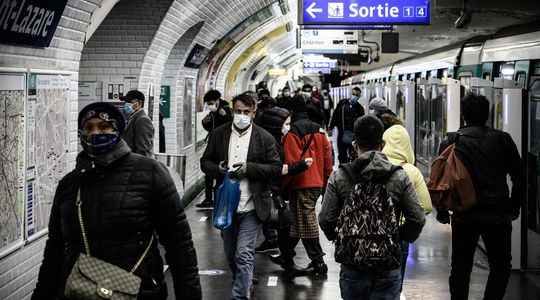A few minutes apart, the loudspeakers of the Paris metro spit out the same warning: “The mask in transport is no longer compulsory, but it remains highly recommended”. With the resurgence of Covid-19 cases, the loudspeakers are on a loop in the transport of major French cities. “At our request, the operators have reinforced the sound messages throughout the network”, explains Ile-de-France mobilities. Strong advice, which contrasts however with the threat of a “135 euro fine” agitated a few months ago. To face the 7th wave, which already causes more than 150,000 contaminations per day according to the Ministry of Health, the French government is betting on the “amplification of prevention messages”, and is careful not to impose any measure. So at the RATP, as in most places open to the public, we wear out the disc, hoping that the reminders of barrier gestures and “responsibility” will be enough to pass the peak.
Despite this refrain, few faces appear masked again. Until when can the executive slow down without forcing? Like the masks, Elisabeth Borne also called on French people over 60 to benefit from a second booster dose, but the campaign remains timid for the moment. And again, simple “recommendations”, as the incidence rate doubles, and the increase begins to be felt in the hospital. Critical care admissions increased by 2% in 14 days. They should climb in the coming weeks.
A few months ago, these figures would have been presented as a harbinger of new restrictions. Or at least agitated with concern by the scientists. The situation has changed. The level of immunity is high, thanks to previous waves and vaccination (92% of French people are first-time vaccinated). The virulence of the BA.4 and BA.5 subvariants causing the rise in cases appears to be the same as with Omicron, although some of its symptoms are questionable. “The government was right not to make it compulsory to wear a mask,” said Jean-François Delfraissy, this Thursday on RTL.
The situation has changed, but the hospital remains busy
The President of the Scientific Council believes that the 7th wave, whose peak is expected in mid-July, “should not spoil the summer”. It all depends for whom. “We are not expecting levels of saturation comparable to the first wave, especially since the school holidays are coming. No disaster of course, but there will be a crowd at the hospital. The situation will be far from there. be favorable, and it is no longer possible to ask caregivers to undergo as before”, alarms epidemiologist at the University of Montpellier Mircea Sofonea to L’Express.
If all the resuscitation beds will probably not be occupied at the height of the wave, no projection from his team or from the Pasteur Institute, the two referents on the question, is not available for the moment. It is therefore difficult to judge whether simple recommendations will suffice, especially since the period is not comparable to the previous ones: “The virus is changing, immunity is changing, and the weariness of the French is changing”, summarizes Mircea Sofonea.
The specialist, however, regrets the absence of a clear line. Thresholds beyond which additional measures would be required could have been discussed with caregivers. “In the absence of such indicators, it’s carte blanche. This allows the executive to wait until the last moment, as always, so that its choices are naturally imposed on the French”, annoys the epidemiologist.
“The incentives could have been made upstream,” said Mahmoud Zureik, professor of epidemiology and public health at the University of Versailles (UVSQ). Are they effective? “Wearing a mask is not returning enough to stop the 7th wave, there are still 20% of the population who have not had a reminder and a second reminder must be distributed to the elderly. The hospital does not need to ‘a new overload’, warns the researcher.
Elisabeth Borne’s bet is therefore not guaranteed. The resumption of the epidemic “is not a strong alert, but it remains an alert”, decided, a week ago, the president of the orientation council for the vaccine strategy Alain Fischer. Yet the executive seems to be heading down a path without resorting to coercion. On July 31, at the heart of the 7th wave, the state of health emergency will expire, and the preliminary bill presented by Elisabeth Borne to equip itself with a “monitoring and health security system” will not does not plan to extend the health pass.
“The hospital can crack without the beds being full”
Some caregivers are worried about this strategy: “The hospital can crack without the beds being full”, retorts Eric Tricot, anesthesiologist at the Henri Mondor hospital in Créteil. He testifies to a “tense” atmosphere in the rest room: “The staff is physically and psychologically exhausted”. “The possibility of not taking a vacation, or of falling ill is worrying. And those who will remain in post have accumulated fatigue,” he warns. General malaise, as shown by a recent survey.
Still, politically and psychologically, increasing the restrictions to relieve the hospital seems unacceptable. “It is no longer possible to constrain the entire population when a small part of the French are at risk”, estimates Xavier Briffault, sociologist of mental health. This CNRS researcher is monitoring another epidemic, that of mental pathologies.
Prevalence of depression tripled since Covid-19, study finds CoviPrev. In particular because of uncertainty and constraints, explains the specialist. He considers that the government should rather play its bet thoroughly and rule out the use of constraints: “Health insurance could contact the most at risk, whom it knows precisely thanks to the statistics collected so far, to alert them, their offer a callback and send them an FFP2 mask,” he said. However, for the moment, this type of mask is not even mentioned in public transport alerts.
